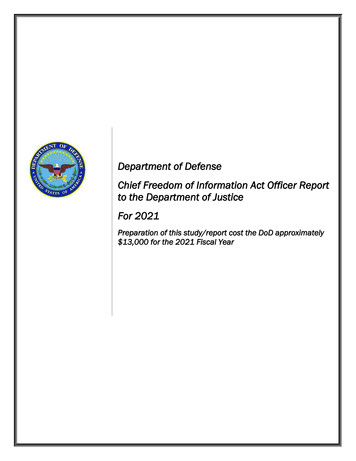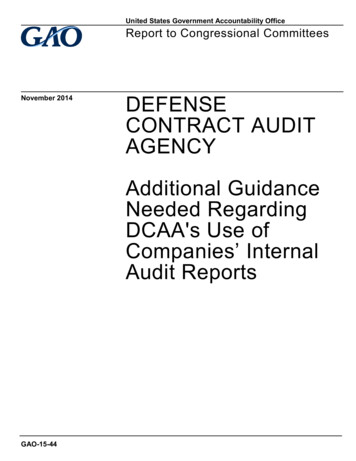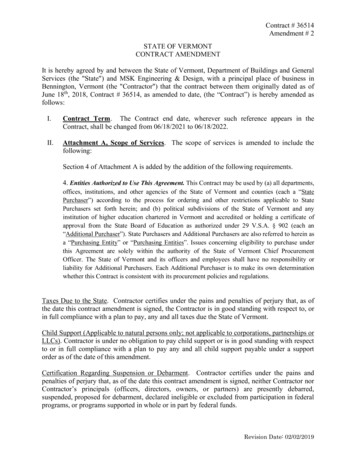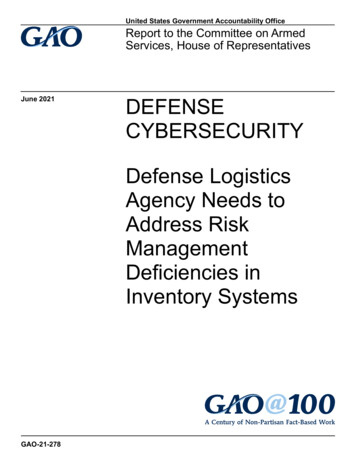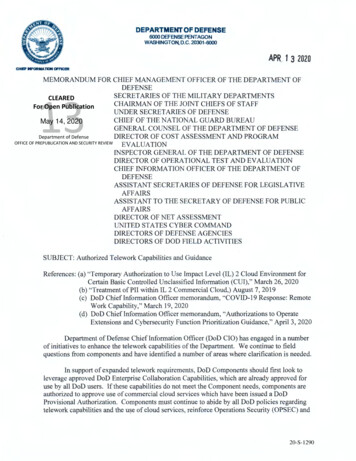
Transcription
Report No. DODIG-2016-001I nspec tor Ge ne ralU.S. Department of DefenseOCTOBER 1, 2015Evaluation of Defense ContractManagement Agency Actionson Reported DoD ContractorBusiness System DeficienciesI N T E G R I T Y E F F I C I E N C Y A C C O U N TA B I L I T Y E X C E L L E N C E
I N T E G R I T Y E F F I C I E N C Y A C C O U N TA B I L I T Y E X C E L L E N C EMissionOur mission is to provide independent, relevant, and timely oversightof the Department of Defense that supports the warfighter; promotesaccountability, integrity, and efficiency; advises the Secretary ofDefense and Congress; and informs the public.VisionOur vision is to be a model oversight organization in the FederalGovernment by leading change, speaking truth, and promotingexcellence—a diverse organization, working together as oneprofessional team, recognized as leaders in our field.Fraud, Waste & AbuseHOTLINEDepartment of Defensedodig.mil/hotline 8 0 0 . 4 2 4 . 9 0 9 8For more information about whistleblower protection, please see the inside back cover.
Results in BriefEvaluation of Defense Contract Management AgencyActions on Reported DoD Contractor BusinessSystem DeficienciesOctober 1, 2015Finding (cont’d)ObjectiveIn 8 of 21 cases, contracting officers did not withhold apercentage of contractor payments pursuant to DFARSclause 252.242-7005(e). Without a payment withhold, theGovernment is not protected from the effects of businesssystem deficiencies.We evaluated Defense Contract ManagementAgency’s (DCMA) actions on DoD contractorbusiness system deficiencies reported in21 Defense Contract Audit Agency (DCAA)audit reports. Our objective was to assessDCMA compliance with the Defense FederalAcquisition Regulation Supplement (DFARS).This is the second of two reports weissued on DCMA compliance with theDFARS requirements.FindingFor the 21 DCAA reports we evaluated,DCMA contracting officer actions didnot comply with one or more DFARSrequirements involving reported businesssystem deficiencies. DCMA contractingofficers did not: issue timely initial and finaldeterminations, obtain or adequately evaluatecontractor responses, and withhold a percentage ofcontractor payments.For example, in 17 of 21 cases,contracting officers did not issue finaldetermination letters within 30 daysas DFARS Procedures, Guidance, andInformation (PGI) 242.7502(d)(2)(ii)(C)provides. On average, contractingofficers took 252 days to issue the finaldeterminations. This likely caused delaysin correcting significant business systemdeficiencies and lengthened the time theGovernment was unable to rely on datagenerated by the business systems.Visit us at www.dodig.milManagement ActionsIn response to Report No. DODIG-2015-139, “Evaluation ofDefense Contract Management Agency Contracting OfficerActions on Reported Deficiencies Involving DoD Contractors’Estimating Systems,” June 29, 2015, DCMA held severaltraining sessions on the business system requirements.In addition, DCMA made business system compliance aspecial focus during internal reviews, and implementeda tracking tool.RecommendationsWe recommend that the Director, DCMA: review the 21 cases and ensure that contracting officerstake appropriate action on the reported businesssystem deficiencies, better enforce the use of the business system trackingtool and consider requiring a Board of Review when acontracting officer determines that a reported deficiencyis not significant, and consider appropriate remedial actions for contractingofficers not complying with the DFARS.Management Commentsand Our ResponseIn an September 25, 2015, response, the Director, DCMAagreed to the reported recommendations. However, we arerequesting additional comments for Recommendation 1.a.DODIG-2016-001 (Project No. D2013-DAPOCF-0201.002) i
Recommendations TableManagementDirector, Defense Contract Management AgencyPlease provide Management Comments by October 30, 2015.ii DODIG-2016-001 (Project No. D2013-DAPOCF-0201.002)RecommendationsRequiring CommentNo AdditionalComments Required1.a1.b, 2, and 3
INSPECTOR GENERALDEPARTMENT OF DEFENSE4800 MARK CENTER DRIVEALEXANDRIA, VIRGINIA 22350-1500MEMORANDUM FOR DIRECTOR, DEFENSE CONTRACT MANAGEMENT AGENCYDIRECTOR, DEFENSE CONTRACT AUDIT AGENCYOctober 1, 2015SUBJECT: Report on Evaluation of Defense Contract Management Agency Actions on ReportedDoD Contractor Business System Deficiencies (Report No. DODIG-2016-001)We are providing this report for your review and comment. We evaluated Defense ContractManagement Agency’s actions on business system deficiencies reported in 21 Defense ContractAudit Agency reports. In several instances, contracting officers did not comply with therequirements of Defense Federal Acquisition Regulation Supplement clauses 252.242-7006and 252.242-7005 for issuing timely initial and final determinations, obtaining and evaluatingthe contractor’s response to the reported deficiencies, and withholding payments foruncorrected deficiencies.We considered management comments on a draft of this report. DoD Instruction 7650.03requires that recommendations be resolved promptly. Comments from the Director, DefenseContract Management Agency, were partially responsive. We request additional comments onRecommendation 1.a by October 30, 2015.Please provide comments that conform to the requirements of DoD Instruction 7650.03.Please send a PDF file containing your comments to the e-mail address included in the lastparagraph of this memorandum. Copies of your comments must have the actual signature ofthe authorizing official for your organization. We cannot accept the /Signed/ symbol in placeof the actual signature. If you arrange to send classified comments electronically, you mustsend them over the SECRET Internet Protocol Router Network (SIPRNET).We appreciate the courtesies extended to the staff. Please direct questions toMs. Carolyn R. Hantz at (703) 604-8877, or e-mail at carolyn.hantz@dodig.mil.Randolph R. StoneDeputy Inspector GeneralPolicy and OversightDODIG-2016-001 iii
ContentsIntroductionObjective 1Background 1Finding. Contracting Officers Did Not ComplyWith DFARS Requirements and DCMA Policy 3Scope of Evaluation 3Results of Evaluation 4DCMA Internal Controls Related to Business Systems 9Previous DoD IG Finding and DCMA Management Actions 10Conclusion 11Recommendations, Management Comments, and Our Response 11AppendixesAppendix A. Scope and Methodology 15Use of Computer-Processed Data 15Use of Technical Assistance 15Prior Report Coverage 15Appendix B. Selected DCAA Reports and Responsible DCMA Field Office 17Appendix C. Details of DCMA Management Comments and Our Responsesto Four Cases 18Management CommentsDefense Contract Management Agency 20Acronyms and Abbreviations 24iv DODIG-2016-001
IntroductionIntroductionObjectiveWe evaluated Defense Contract Management Agency (DCMA) actions onDoD contractor business system deficiencies reported by the Defense ContractAudit Agency (DCAA). Our primary objective was to determine if DCMA compliedwith applicable Defense Federal Acquisition Regulation Supplement (DFARS)requirements. For example, we evaluated DCMA contracting officer actions onaccounting system deficiencies for compliance with: DFARS clauses 252.242-7005, “Contractor Business Systems,”and 252.242.7006, “Accounting System Administration” andDFARS Procedures, Guidance, and Information (PGI) 242-7502,“Contractor Accounting Systems and Related Controls.”As part of the evaluation, we randomly selected 21 of 164 DCAA business systemdeficiency reports issued from July 2012 through June 2013. See Appendix A fora discussion of our scope and methodology. This is the second of two reportswe issued on DCMA contracting officer compliance with the DFARS requirementsrelative to contractor business systems. Our first report addressed an evaluationof DCMA contracting officer actions on reported DoD contractor estimating systemdeficiencies. This report addresses our evaluation of contracting officer actionson other contractor business systems, including accounting, billing, and materialmanagement and accounting systems.BackgroundBusiness System RequirementsContractor business systems and related internal controls are the first line ofdefense against waste, fraud, and abuse. A DoD contractor’s accounting and billingsystems encompass the policies, procedures, practices, and controls used by thecontractor to gather, record, classify, analyze, summarize, interpret, and presentaccurate and timely financial data for reporting in compliance with applicable laws,regulations, and management decisions.Inadequacies with contractor business systems led to the enactment of majorchanges to related DoD regulations. On February 24, 2012, DoD revised the DFARSaddressing contractor business systems to incorporate time limits for taking actionon reported business system deficiencies and to require payment withholding ifthe system is disapproved. For example, DFARS PGI 242.75, “Contractor AccountingDODIG-2016-001 1
IntroductionSystems and Related Controls,” states that the contracting officer should issue afinal determination on reported deficiencies within 30 days after receiving thecontractor’s response to the initial determination of deficiencies.For contracts that include DFARS clause 252.242-7005(e), “Withholding Payments,”contracting officers must withhold 5 percent of payments from a DoD contractorif significant deficiencies exist with any of the contractor’s business systems.Defense Contract Audit AgencyDCAA performs contract audits for DoD and performs contract audit servicesfor non-DoD Federal organizations on a reimbursable basis. DCAA operatesin accordance with DoD Directive 5105.36, “Defense Contract Audit Agency,”January 4, 2010, and reports to the Under Secretary of Defense (Comptroller)/Chief Financial Officer.The Agency performs several types of contract audits, such as audits of contractorclaimed incurred costs, forward-pricing proposals, and contractor businesssystems. In FY 2014, DCAA examined 183 billion in contract costs that wereprocessed through DoD contractor business systems. If DCAA uncovers asignificant business system deficiency during a system review or other relatedaudit, DCAA policy requires that the auditor issue a “deficiency report” to alert thecognizant DCMA contracting officer of the deficiency and recommend contractorcorrective action. Between July 2012 and June 2013, DCAA issued 164 businesssystem deficiency reports.Defense Contract Management AgencyDCMA is a component of the DoD that works directly with DoD contractors toensure that DoD, Federal, and allied government supplies and services are deliveredon time and at projected cost, and meet all performance requirements.DCMA contracting officers are responsible for several contract administrativefunctions, such as approving or disapproving contractor business systems,determining final indirect cost rates on cost-reimbursement contracts, andevaluating contractor compliance with the Cost Accounting Standards. DCMAcontracting officers are required to consider any DCAA business system deficiencyreports and other expert advice to help them determine whether to approve ordisapprove contractor business systems.For the 21 DCAA reports we selected for evaluation, DCMA contracting officerswere responsible for determining the adequacy of the contractor’s business systemsand taking action required by DFARS clause 252.242.7006 and DFARS PGI 242.7502.2 DODIG-2016-001
FindingFindingContracting Officers Did Not Comply With DFARSRequirements and DCMA PolicyFor all 21 DCAA reports we evaluated, DCMA contracting officers did not complywith one or more DFARS requirements. Each DCAA report outlined significantbusiness system deficiencies that impacted DoD’s ability to rely on informationproduced by the system. DCMA contracting officers did not take appropriateor timely action to address the significant business system deficiencies DCAAhad reported.Scope of EvaluationWe evaluated DCMA contracting officer actions on 21 DCAA reports of contractorbusiness system deficiencies to determine whether the actions complied withDFARS requirements and DCMA instructions. DFARS clause 252.242-7005(b),“Contractor Business Systems,” defines a significant deficiency as a shortcomingin the system that materially affects the ability of DoD officials to rely uponinformation produced by the system that is needed for management purposes.Examples of deficiencies reported by DCAA included the contractor’s failure to: ensure that direct material and labor costs were charged to theappropriate contract, perform adequate or periodic reviews of its accounting systemand rate structure, and notify the Government of cost accounting changes within 60 days,comply with labor categories specified in the contract.These types of deficiencies can materially impact the Government’s ability torely on information produced by a contractor’s business system.For each DCAA report, our evaluation primarily focused on whether thecontracting officer:1. issued an initial determination on reported significant deficiencieswithin 10 days in accordance with DFARS PGI 242-7502(d)(2)(ii)(A);2. obtained a written contractor response to the initial determinationwithin 30 days pursuant to DFARS clause 252.242-7006(d)(2);3. evaluated the contractor’s response as discussed inDFARS PGI 242-7502(d)(2)(ii)(C);4. issued a final determination to approve or disapprove the system within30 days in accordance with DFARS PGI 242-7502(d)(2)(ii)(C); andDODIG-2016-001 3
Finding5. withheld a percentage of payments from contractor billings to theGovernment in accordance with DFARS Clause 252.242-7006(e), if thesystem is disapproved.Results of EvaluationFor the 21 DCAA deficiency reports we selected for evaluation, Table 1 depicts theinstances when DCMA contracting officers did not comply with the five DFARS keyrequirements we evaluated.Table 1. Results of Evaluation on Actions Taken in Response to 21 DCAA AccountingSystem Deficiency ReportsContracting Officer Actions That Did Not Comply With DFARSDCAA Report ationWithhold B11090002XXXXX09821-2011C12500002 002XTotal Instances ofNon-ComplianceNon-Compliance Rate4 DODIG-2016-001Evaluation %76%81%38%
FindingContracting Officers Did Not Timely IssueInitial DeterminationsDFARS Criteria and DCMA Instructions on Initial DeterminationsDFARS PGI 242.7502(d)(2)(ii)(A) states,Within 10 days of receiving the DCAA report, if the contractingofficer makes a determination that there is a significant deficiency,the contracting officer should provide an initial determination ofdeficiencies and a copy of the report to the contractor and requirethe contractor to submit a written response.The initial determination involves the contracting officer making a preliminaryassessment as to whether a significant deficiency may exist based on their reviewof DCAA reported findings. In the initial determination letter, the contractingofficer describes each significant deficiency in sufficient detail to allow thecontractor to understand the deficiency.DCMA Instruction 131, “Contractor Business Systems,” paragraph 3.2.2, requiressupervisor approval of all proposed initial determinations before issuance.Contracting Officer Actions Did Not Comply With DFARS RegardingInitial DeterminationsFor 17 of 21 cases we evaluated, DCMA contracting officers did not comply withthe DFARS PGI requirements for issuing an initial determination. In four instances,the contracting officers never issued the required initial determination letter.In one instance, the contracting officer did not require the contractor to providea written response to the initial determination. In the remaining 12 instances,the contracting officers issued determination letters, but they were not issuedwithin the 10-day standard. On average, contracting officers took 91 days toissue the 12 initial determination letters. The contracting officers’ failure to issuetimely initial determination letters likely resulted in delays and lengthened thetime the Government was unable to rely on the financial data produced by thecontractor’s system.For 1 of the 12 instances, the contracting officer also did not require the contractorto provide a written response to the initial determination.Finally, in eight instances, we found no evidence of a supervisor approving theinitial determination letter, as DCMA Instruction 131, paragraph 3.2.2 requires.The lack of supervisory approval diminishes DCMA management oversight ofcontracting officer actions on business systems.DODIG-2016-001 5
FindingContracting Officers Did Not Follow Up With Contractorson Overdue and Incomplete ResponsesDFARS Criteria for Obtaining a Contractor’s ResponseDFARS clause 252.242-7006(d)(2) requires the contractor to respond in writingwithin 30 days of receiving the contracting officer’s initial determination thatidentified significant system deficiencies.Obtaining a contractor’s written response expedites the corrective action processfor resolving the reported deficiencies. A timely contractor response is necessaryto ensure that the contracting officer promptly receives either notice that thedeficiencies have been corrected or an acceptable corrective action plan showingmilestones and actions to eliminate the reported deficiencies.Contracting Officer Did Not Follow Up on Overdue and IncompleteContractor ResponsesIn 13 of the 21 cases we evaluated, the contracting officer did not take appropriateaction when a contractor’s response became overdue (exceeded 30 days), or wasincomplete. In four of these instances, the contractor did not provide a responseto the contracting officer. In nine instances, the contracting officer received aresponse, but after the 30-day timeframe outlined in DFARS. On average, thecontracting officer received the nine responses 170 days after issuing the initialdetermination. Once the contractor responses became overdue, the DCMAcontract file lacked evidence that the contracting officers had followed up withthe contractor to obtain the responses.An untimely contractor response to the initial determination may cause systemdeficiencies to remain uncorrected, thereby diminishing the reliability that can beplaced on the accuracy of the financial data reported by the contractor’s system.Contracting Officers Did Not Adequately or Timely Evaluatethe Contractor’s Responses to the Initial DeterminationDFARS Criteria for Evaluating the Contractor’s ResponseDFARS PGI 242.7502(d)(2)(C) states,Within 30 days of receiving the contractor’s response, thecontracting officer, in consultation with the auditor or cognizantfunctional specialist, should evaluate the contractor’s response andmake a final determination.The contracting officer is responsible for evaluating the sufficiency of thecontractor’s response on the initial determination to determine whether thecontractor addressed all significant deficiencies. If the contractor includes a6 DODIG-2016-001
Findingcorrective action plan in its response, the contracting officer is required toverify the proposed actions and the milestones to eliminate the deficiencies inconsultation with the auditor.DCMA Did Not Perform an Adequate or Timely Evaluation ofContractor ResponsesFor 16 of the 21 cases, contracting officers did not comply with the DFARSrequirement for evaluating the contractor’s response, including: 3 cases lacking evidence that the contracting officers had evaluated thecontractor’s response to the reported deficiencies; 3 cases when contracting officers did not perform an adequate evaluationand did not complete the evaluation within 30 days; and 5 cases when contracting officers failed to perform an adequate evaluationof the contractor’s response;5 cases when contracting officers completed the evaluation beyond the30-day timeframe.Regarding the untimely evaluations, contracting officers took 261 days onaverage to complete their evaluation of the contractor’s response. To protect theGovernment’s interests, the contracting officer has an obligation to evaluate thecontractor’s response in order to verify that the contractor’s proposed actions fullyaddress the reported deficiencies. Without conducting an adequate evaluation,the contracting officer may not detect that the proposed corrective actions areinsufficient to eliminate significant deficiencies.Contracting Officers Did Not Issue Final Determinations in aTimely MannerDFARS Criteria for Final DeterminationsDFARS PGI 242.7502(d)(2)(ii)(C) states the contracting officer should issue a finaldetermination within 30 days of receiving the contractor’s response. The finaldetermination reflects the contracting officer’s ultimate decision on whether toapprove or disapprove the business system.DFARS clause 252.215-7002(e)(3) states,The Contracting Officer will evaluate the Contractor’s response andnotify the Contractor, in writing, of the Contracting Officer’s finaldetermination concerning (i) Remaining significant deficiencies;(ii) The adequacy of any proposed or completed corrective action;and (iii) System disapproval, if the Contracting Officer determinesthat one or more significant deficiencies remain.DODIG-2016-001 7
FindingDCMA Instruction 131, paragraph 2.3, states that a DCMA contracts director isresponsible for reviewing and approving all final determinations of a contractorbusiness system before issuance. DCMA Instruction 131, paragraph 3.4.1, alsorequires approval from a DCMA contracts director if the contracting officeranticipates taking more than 30 days to issue a final determination.Contracting Officer Actions Did Not Comply With DFARS Criteria forFinal DeterminationsIn 17 of the 21 cases, the contracting officer did not comply with the DFARSrequirement for making a final determination on a contractor business system.In three cases, the contracting officer did not issue a final determination. Inthe remaining 14 cases, the contracting officer took more than 30 days toissue the final determination. DCMA took 252 days on average to issue the14 determinations. The contracting officers also did not obtain the requiredapproval for exceeding the 30-day DFARS standard as DCMA Instruction 131,paragraph 3.4.1, requires.Furthermore, in 2 of the 14 cases, the contracting officer did not obtain therequired approval for issuing the final determination as DCMA Instruction 131,paragraph 2.3, requires.The failure to make a timely final determination increases the Government’srisk that significant business system deficiencies remain uncorrected, therebydiminishing the Government’s ability to rely on the data produced by the system.Making a final determination in a timely manner is important when the systemis disapproved, because it triggers the requirement to withhold payments and toprotect the Government’s interests.Contracting Officers Did Not Disapprove the Contractor’sSystem and Withhold PaymentsDFARS Criteria for Implementing Payment WithholdsDFARS clause 252.242-7005(e) states that if the contracting officer disapproves theaccounting system, the contracting officer will withhold 5 percent of contractorbillings until the contracting officer has determined that the contractor correctedall significant deficiencies.DFARS clause 252.242-7006(f) requires that if the contracting officer makesa final determination to disapprove the contractor’s accounting system, thecontracting officer will withhold payments on contracts that include DFARSclause 252.242-7005.8 DODIG-2016-001
FindingContracting Officer Actions Did Not Comply With DFARS Requirements forWithholding PaymentsIn 8 of 21 cases, DCMA contracting officers did not withhold payments even thoughsignificant deficiencies remained or could have remained. In two of eight instances,the contracting officer elected not to disapprove the contractor’s system andimplement payment withholds even though he determined that significantdeficiencies existed. For the remaining six instances, the contracting officerapproved the system without performing an adequate evaluation of the contractor’scorrective actions. Without an adequate evaluation of the contractor’s correctiveactions, the contracting officers could have approved the business systems withoutdetecting that significant deficiencies still existed. If significant system deficienciesstill existed, the contracting officer had an obligation to disapprove the system andimplement payment withholdings to protect the Government’s interests.DCMA Internal Controls Related to Business SystemsDCMA Business System Tracking ToolSince August 2013, DCMA has maintained a spreadsheet referred to as the“Contractor Business System Determination Timeline Tracking Tool.” The Tooltracks key milestone dates from receipt of a DCAA audit report to issuance of afinal determination. DCMA management uses the tool to monitor the status ofcontracting officer actions on reported business system deficiencies and to takecorrective actions when appropriate. DCMA designed the Tool to ensure thatcontracting officers issue determinations and evaluate contractor responses in atimely manner.For 10 of 21 cases we evaluated, contracting officers were required to track the keymilestone dates in the Tool. In five cases, the contracting officer failed to use thetool and track the key milestone dates as required. DCMA should better enforce itsuse of the Tool, which is an important control for ensuring that contracting officersissue determinations and evaluate contractor responses in a timely manner.DCMA Board of Review ProcessDCMA Instruction 134, “Board of Review,” states that certain contracting actionsare subject to an additional level of review referred to as the Headquarters Boardof Review. According to DCMA Instruction 131, a DCMA Headquarters “Board ofReview” is required when the contracting officer rejects the auditor’s advice ona reported business system deficiency. The Instruction states that a rejectionof advice occurs when a contracting officer and DCAA disagree on whether adeficiency in a business system exists. However, the Instruction also states thata Board of Review is not required when the contracting officer agrees that aDODIG-2016-001 9
Findingdeficiency exists, but rejects DCAA’s opinion that the deficiency is significant.The DFARS requirements for business systems, such as the need to issue timelydeterminations and to withhold payments, apply only to “significant” businesssystem deficiencies.In 4 of 21 cases, contracting officers were required to obtain a Board ofReview before issuing their final determination. However, in one of thefour cases (25 percent), the contracting officer failed to obtain the requiredreview. DCMA should take action to better enforce the requirement for obtaininga Board of Review.For five additional cases, contracting officers had rejected DCAA’s opinion thatthe reported deficiencies were significant. However, the DCMA contract files forthree of the five cases (60 percent) lacked adequate rationale for rejecting theauditor’s opinion and concluding that the deficiencies were not significant. Forexample, for two of the three cases, DCAA reported inadequacies related to thecontractor’s failure to properly identify expressly unallowable costs and to supportcosts claimed on Government contracts. These inadequacies appear to qualify assignificant deficiencies outlined in DFARS clause 252.242-7006(a)(3). Although thecontracting officer concluded that these deficiencies warranted corrective actions,she determined they were not significant and she did not document adequaterationale for her determination.When used, the Board of Review is an effective tool for evaluating theappropriateness of contracting officer actions on reported business systemsdeficiencies. DCMA should consider requiring a Board of Review in all caseswhen contracting officers reject DCAA advice, including rejections involvingthe significance of a reported deficiency. This change should help to providereasonable assurance that contracting officers take appropriate actions onbusiness system deficiencies prior to approving the system.Previous DoD IG Finding and DCMAManagement ActionsOn June 29, 2015, we issued Report No. DODIG-2015-139, “Evaluation of DefenseContract Management Agency Contracting Officer Actions on Reported DeficienciesInvolving DoD Contractors’ Estimating Systems.” Regarding 17 of 18 DCAA‑reportedestimating deficiencies we evaluated, contracting
21 Defense Contract Audit Agency (DCAA) audit reports. Our objective was to assess DCMA compliance with the Defense Federal Acquisition Regulation Supplement (DFARS). This is the second of two reports we issued on DCMA compliance with the DFARS requirements. Finding. For the 21 DCAA reports we evaluated, DCMA contracting officer actions did

